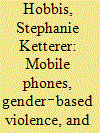|
|
|
Sort Order |
|
|
|
Items / Page
|
|
|
|
|
|
|
| Srl | Item |
| 1 |
ID:
180641


|
|
|
|
|
| Summary/Abstract |
Based on an in-depth examination of the acquisition, use, maintenance and deterioration of solar home systems in a village in Malaita, Solomon Islands, this article challenges the analytical focus of current debates on electrification in Pacific Island countries – why Pacific Island countries have not yet sufficiently electrified to achieve their development goals. Alternatively it examines what is, how, in this case, rural Solomon Islanders have integrated already available electricity into their daily lives. This perspectival shift highlights how rural Solomon Islanders have developed an energy identity that corresponds to their needs, interests and values, rather than those of national and international actors. It re-emphasises the struggles of national and international electrification initiatives in rural environments, linking them to a broader distrust in the motivations of external actors. At the same time, it reveals how, throughout their life cycle, rural solar home systems have become integrated into processes of social reproduction rather than development aspirations. Contrary to dominant debates, rural solar home systems matter most in the opportunities that they provide for reciprocal exchange than for what the electricity enables them to do.
|
|
|
|
|
|
|
|
|
|
|
|
|
|
|
|
| 2 |
ID:
161586


|
|
|
|
|
| Summary/Abstract |
This paper examines the potential benefits and pitfalls of mobile phones for accessing social services, particularly in response to gender‐based violence, in Solomon Islands and Papua New Guinea. Drawing on 13 months of ethnographic field research, I show how mobile phones increase rather than decrease perceived distances between social service providers and those they intend to serve. Mobile phones exaggerate the visibility of the shortcomings of the Solomon Islands and Papua New Guinea states and solidify an already entrenched distrust in the state and state services. This distrust is accentuated in experiences with mobile phone‐based mediations of gender‐based violence. Despite the positive influences of mobile phones, they are also recognised as conduits of violence. As such, mobile phones are not only morally ambivalent technologies but also, at times, actively disliked and their use discouraged. This challenges the optimism that surrounds many information and communication technologies for development (ICT4D) projects. When assessing the potentials, successes, and failures of ICT4D programmes, there is a need to pay more attention to the consequences of ‘negative’ or ‘unreliable’ usages of mobile phones as relational technologies.
|
|
|
|
|
|
|
|
|
|
|
|
|
|
|
|
|
|
|
|
|